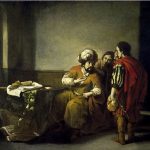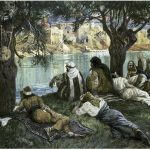A reading from the Book of the Prophet Isaiah 61:1-2, 10-11

Bill Ayres
Recent Posts
'Hear the Word!' by Bill Ayres: Third Sunday of Advent
Topics: 3rd Sunday of Advent, a reflection on the coming Sunday's Gospel, catholic renew progam, RENEW International, Magnificat, Gospel of John
"Hear the Word!" by Bill Ayres: Twenty-fourth Sunday in Ordinary Time
A reading from the Book of the Sirach
(Chapter 27:30-28:7)
“Forgive your neighbor’s injustices; then when you pray, your own sins will be forgiven. Could anyone nourish anger against another and expect healing from the Lord? Could anyone refuse mercy to another like himself, can he seek pardon for his own sins? If one who is but flesh cherishes wrath, who will forgive his sins? Remember your last days and put enmity aside, remember death and decay, and cease from sin! Think of the commandments, hate not your neighbor; remember the Most High’s covenant, and overlook faults.”
Please read that again and let it sink in.
It is so easy to focus on minor injustices done to us, a seeming neglect or inappropriate words. Wonderful relationships can be ruined, families torn apart. Why? Cannot justice and love be restored through patience and forgiveness? These are the same gifts we ask from God for ourselves. Without them, we are at a loss and isolated. With them, we are renewed and enlivened.
Responsorial Psalm
(Psalm 103:1-2, 3-4, 9-10, 11-12)
“The Lord is kind and merciful, slow to anger, and rich in compassion.” Is that the God you believe in? I hope so. It is the only God that exists.
A reading from the Letter of Saint Paul to the Romans
(Chapter 14:7-9)
“Brothers and sisters: None of us lives for himself, and no one dies for himself. For if we live, we live for the Lord, if we die we die for the Lord; so then, whether we live or die, we are the Lord’s. For this is why Christ died and came to life, that he might be the Lord of the dead and of the living.”
Let’s think about that for a moment. Jesus is with us throughout our lives, every day of our lives and at the time of our deaths—especially then. Have you ever had the opportunity and privilege to be with someone who is dying? It is a sad time, a challenging time, but also a blessed time with Jesus and our loved one. It is a time when gifts are given. We can call forth those gifts for the dying person, and they will come to us as well in faith.
A reading from the holy Gospel according to Matthew
(Chapter 18:21-35)
“Peter approached Jesus and asked him, ‘Lord, if my brother sins against me, how often must I forgive? As many as seven times?’ Jesus answered, ‘I say to you, not seven times but seventy seven times.’” Peter would know what Jesus meant. Seven was a powerful number in Jewish culture, and seven times seven would be heard to mean as many as needed.
But to make it clear, Jesus tells a parable of a king who forgives a servant who owed the king “a huge amount.” The servant had pleaded with the king: “Be patient with me and I will pay you back in full.” The master was moved with compassion, forgave the loan, and let the man go. However, then the servant found another man “who owed him a much smaller amount. He seized him and started to choke him, demanding, ‘Pay back what you owe.’ Falling to his knees, his fellow servant begged him, ‘Be patient with me and I will pay you back.’ But he refused. Instead, he had the fellow servant put in prison until he paid back the debt.”
Other servants saw what had happened and told their master. “His master summoned him and said to him, ‘You wicked servant! I forgave you your entire debt because you begged me to. Should you not have had pity on your fellow servant, as I had pity on you?’ Then in anger his master handed him over to the torturers until he should pay back the whole debt. So will my heavenly Father do to you, unless each of you forgives your brother from your heart.”
Jesus is using language and an example from his time, not ours, but the point is the same. We must forgive others if we want to ask God for forgiveness. Yes. Sometimes that is very hard, but it is what we are called to do.
Is there someone that you need to forgive? Ask the Holy Spirit who lives within you for the strength to forgive on whatever level you are able. Does it mean that you have to be best friends with the person? Sometimes it works out that way, but that is not always possible. What is possible for you? How can you take the first step or help a person you know to take that step toward reconciliation?
Excerpts from the English translation of the Lectionary for Mass © 1969, 1981, 1997, International Commission on English in the Liturgy Corporation (ICEL). All rights reserved.
Bill Ayres was a founder, with the late singer Harry Chapin, of WhyHunger. Bill was a radio and TV broadcaster for 40 years. He is a member of Our Lady Queen of Martyrs Church in Centerport, New York.
"Hear the Word!" by Bill Ayres: Twenty-third Sunday in Ordinary Time
A reading from the Book of the Prophet Ezekiel
(Chapter 33:7-9)
God calls Ezekiel. “You, son of man, I have appointed watchman for the house of Israel; when you hear me say anything, you shall warn them for me.” In those days the “watchman” had a most important job. He stood on the top of the wall of the city and looked in all directions to determine if an enemy was approaching and then call out to warn the people. All the prophets were like moral watchmen, warning the people of dangers, not only those from foreign enemies but also from within. Ezekiel had warned the people of the danger from the Babylonians, but they did not listen and now, when this prophesy is being recorded, they are in exile in Babylon. God tells Ezekiel not to give up trying: “But if you warn the wicked, trying to turn him from his way, he shall die for his guilt but you shall be saved.”
Have you ever tried to warn someone about an impending danger only to have your warning fall on deaf ears? You tried to be the “watchman” or the “watchwoman,” but you were not heard. Sometimes, you can try again using different words or a friendlier attitude. If you are still not heard, ask yourself why you missed the mark. Were you wrong in voicing your concern, or did the problem lie with the person who has ears yet cannot hear?
Responsorial Psalm
(Psalm 95:1-2, 6-7, 8-9)
“If today you hear his voice, harden not your hearts.” Maybe our problem is not that we have hardened our hearts but that we do not hear God’s voice. Do you hear that voice more during this time of COVID 19, or less? Try to take some time each day, when you pray, to just listen. You may hear nothing, or you may hear the very voice of God. We never know unless we try.
A reading from the letter to the Romans
(Chapter 12:1-2)
Jesus said that the two great commandments were to love God and to love our neighbors. Paul makes that clear to the Christians in Rome: “Brothers and sisters: Owe nothing to anyone, except to love one another; for the one who loves another has fulfilled the law.” Then he writes, “Whatever other Commandments there may be, are summed up in this saying, namely, You shall love your neighbor as yourself. Love does no evil to the neighbor; hence, love is the fulfillment of the law.”
Imagine if all of us Christians really believed that and practiced it, no matter who our neighbor is, whatever his race, whatever her religion or politics. As Paul concludes this reading, “Love does no evil to the neighbor; hence, love is the fulfilment of the law.”
A reading from the holy Gospel according to Matthew
(Chapter 18:15-20)
The last paragraphs of this reading are extraordinary: “Again, amen, I say to you’ if two of you agree on earth about anything for which they are to pray, it shall be granted to them by my heavenly Father. For where two or three are gathered in my name, there I am in the midst of them.”
So, every time we celebrate the Holy Eucharist, Jesus is there in our midst. And every time we pray as a family or with friends, or even when we are not praying but celebrating with each other in love, Jesus is there as well.
I don’t know about you, but I do not think of that presence often enough; and yet, it does not take much to deepen the experience either during the gathering or even after. Jesus is there.
Excerpts from the English translation of the Lectionary for Mass © 1969, 1981, 1997, International Commission on English in the Liturgy Corporation (ICEL). All rights reserved.
Bill Ayres was a founder, with the late singer Harry Chapin, of WhyHunger. Bill was a radio and TV broadcaster for 40 years. He is a member of Our Lady Queen of Martyrs Church in Centerport, New York.
"Hear the Word!" by Bill Ayres: Twenty-second Sunday in Ordinary Time
A reading from the Book of the Prophet Jeremiah
(Chapter 20:7-9)
Being a prophet of God has never been easy for anyone, but for Jeremiah it was excruciating: “I say to myself, I will not mention him, I will speak in his name no more. But then it becomes like a fire burning in my heart, imprisoned in my bones; I grow weary holding it in, I cannot endure it.” Wow! Talk about suffering and unhappiness, and this is only one of Jeremiah’s famous lamentations. Jeremiah had much to be unhappy about. God asked him to deliver a powerful message of repentance to the people in a time of crisis. Jeremiah did, and the people hated him for it and tortured him, imprisoned him, and tried to murder him. No wonder he was so angry with God; and yet, he stayed on message, faithful to his call.
Have you ever had an especially difficult call from God? Maybe it did not entail such a dangerous undertaking, but it had a painful effect on you. Perhaps it was the loss of someone you loved, a long illness, another kind of tragedy. Or perhaps it was having to stand up for truth and love in the face of rejection and condemnation. Whatever it was, you need not be alone in your suffering. A willing listener may not heal your pain but may lighten your load.
Responsorial Psalm
(Psalm 63:2, 3-4, 5-6, 8-9)
“My soul is thirsting for you, O Lord my God.” This is the prayer of a man who lived in the desert and knew what it meant to be thirsty every day. We have only to turn on a faucet to quench our thirst, and we have only to ask God for the water of life, and we will receive.
A reading from the letter to the Romans
(Chapter 12:1-2)
“Do not conform yourselves to this age but be transformed by the renewal of your mind that you may discern what is the will of God.” Rome, in Paul’s time, was a very sophisticated, cosmopolitan city. The Romans had brought clean water through a series of aqueducts as well as the best roads and architecture of the time, but they had also brought many false gods, a violent tyranny, and racist repression of Jews and other minorities. However, since the overall material standard of living was better than it was in most places in the ancient world, Christians could easily fall away from the deeper truth.
I think Paul would see a parallel in our society today with all its modern wonders but also with the over-the-top graphic violence, extreme injustice, distortions of sexuality, and worship of the false god of greed. He would ask us again to “be transformed by the renewal of your mind.”
A reading from the holy Gospel according to Matthew
(Chapter 16:21-27)
In gospel passage read at last Sunday’s Masses, Peter gets it right. He identifies Jesus as the Son of God, and Jesus calls him a rock upon which Jesus will build his Church. Here, Peter gets it wrong. He can’t believe that Jesus will be killed: “Then Peter took Jesus aside and began to rebuke him. God forbid, Lord! No such thing should ever happen to you.” But Jesus replies, “Get behind me, Satan! You are an obstacle to me. You are thinking not as God does, but as human beings do.” So now Peter is not being called a rock, but rather an obstacle, a “stumbling stone.” Why? “Because you are thinking not as God does but as human beings do.” That is certainly a great deal to ask of Peter—to think as God does—but it is necessary if Peter is to lead the Church. Be steadfast, like a rock not a stumbling stone.
Have you ever tried to think as God does? Suppose someone treats you unjustly and tries to make it feel as if it is your fault. You’re furious, and rightfully so, but what do you do? Do you focus your righteous anger on the offender and go after him or her? Or do you step back, ask someone you trust for advice, and then move forward, not seeking revenge but rather truth and justice? Suppose someone betrays your trust on a very important matter in such a way that your reputation is at risk? Or think of something that has actually happened to you. Did you respond in God’s way or in your way?
Jesus never asked Peter to be perfect. He knew all too well that Peter was an impetuous, imperfect man, but he challenged Peter to think “as God does.” It did not always work for Peter, and it won’t for us either, but we can try, one step at a time, one decision at a time, one move, one word that is more loving, more compassionate than before.
Excerpts from the English translation of the Lectionary for Mass © 1969, 1981, 1997, International Commission on English in the Liturgy Corporation (ICEL). All rights reserved.
Bill Ayres was a founder, with the late singer Harry Chapin, of WhyHunger. Bill was a radio and TV broadcaster for 40 years. He is a member of Our Lady Queen of Martyrs Church in Centerport, New York.
"Hear the Word!" by Bill Ayres: Twenty-first Sunday in Ordinary Time
A reading from the Book of the Prophet Isaiah
(Chapter 22:19-23)
This is the sad story of two men who, in turn, held a powerful position in the royal house, being master of the palace. “Thus says the Lord to Shebna, master of the palace: ‘I will thrust you from your office and pull you down from your station. On that day I will summon my servant Eliakim, son of Hilkiah; I will clothe him with your robe, and gird him with your sash, and give over to him your authority.”
That seems to be it. God choses a new man who will be faithful and do the right thing. Shebna was a bad, self-absorbed leader, so God chooses Eliakim who will do better. But that is not the end of the story, because Eliakim turns out no better and abuses his power to enhance his relatives.
This passage prepares us for the gospel reading in today’s Mass in which Jesus promises the “keys to the kingdom of heaven” to Peter, who will faithfully carry out his responsibilities. Does God ask less of us?
Responsorial Psalm
(Psalm 138:1-2, 2. 3. 6-8)
“Lord, your love is eternal: do not forsake the work of your hands.” There is another verse that follows. “When I called, you answered me; you built up strength within me.” This is certainly a time when we need to call out to the Lord. He does not forsake us nor the millions of people who are in far worse conditions than most of us and for whom we pray.
A reading from the Letter of Saint Paul to the Romans
(Chapter 11:33-36)
This is the way Paul ends his Letter to the Romans:
“Oh, the depths of the riches and wisdom and knowledge of God! How inscrutable are his judgements and how unsearchable his ways! For who has known the mind of the Lord or who has been his counselor? Or who has given the Lord anything that may be repaid? For from him and through him and for him are all things. To him be glory forever.”
Paul was always aware that all that we have and all that we are is all gift. We do not have a “deal” with God: “You do this for me God, and I will do this for you.” Our very lives and all that we have is a gift. Let us give thanks today and every day. Even on, no—especially on the days when we do not feel especially gifted.
A reading from the holy Gospel according to Matthew
(Chapter 16:13-20)
This reading has a question from Jesus, an answer from Peter, and a calling from Jesus to Peter. Here is the question: “Who do people say that the Son of Man is?” The disciples tell Jesus what people are saying: “Some say John the Baptist, others Elijah, still others Jeremiah or one of the prophets.” Good guesses, but no. Finally, “Simon Peter said in reply, ‘You are the Christ, the Son of the living God.’ … Jesus said to him in reply, ‘Blessed are you, Simon, son of Jonah. For flesh and blood has not revealed this to you, but my heavenly Father.’”
Then comes Peter’s calling from Jesus: “And so I say to you, you are Peter, and upon this rock I will build my church, and the gates of the netherworld shall not prevail against it. I will give you the keys to the kingdom of heaven. Whatever you bind on earth shall be bound in heaven; and whatever you loose on earth shall be loosed in heaven.”
Peter is the one chosen by God, but Peter is far from perfect. At crucial times, he denies Jesus, and after Jesus dies Peter is on the wrong side of one of the first crucial decisions for the early Church, whether non-Jewish converts must be circumcised. Peter said yes, but Paul said no. Peter eventually agreed. He was not perfect, but he was always faithful.
Excerpts from the English translation of the Lectionary for Mass © 1969, 1981, 1997, International Commission on English in the Liturgy Corporation (ICEL). All rights reserved.
Bill Ayres was a founder, with the late singer Harry Chapin, of WhyHunger. Bill was a radio and TV broadcaster for 40 years. He is a member of Our Lady Queen of Martyrs Church in Centerport, New York.
"Hear the Word!" by Bill Ayres: Twentieth Sunday in Ordinary Time
A reading from the Book of the Prophet Isaiah
(Chapter 56:1, 6-7)
The context for this passage is the return of the Jewish people from exile in Babylon in the sixth century before the birth of Jesus. Isaiah starts off with a call and a promise: “Thus says the Lord: Observe what is right, do what is just; for my salvation is about to come, my justice, about to be revealed.” There were many foreigners who wanted to convert to Judaism. “Them I will bring to my holy mountain and make joyful in my house of prayer…. For my house shall be called a house of prayer for all the peoples.” Isaiah is proclaiming a much more inclusive religion, one that welcomes foreigners.
Our Catholic Church in the United States has always welcomed immigrants and foreigners, including our own ancestors. Today, immigrants are still a growing part of our Church and we welcome them.
Responsorial Psalm
(Psalm 67:2-3, 5, 6, 8)
“O God, let all the nations praise you.” Imagine, if that really happened!
A reading from the Letter of Saint Paul to the Romans
(Chapter 11:13-15, 29-32)
Paul refers to himself as “the apostle to the Gentiles,” and he is saying that both Jews and Gentiles have a history of rejecting Jesus. Yet, from their disobedience has come reconciliation. “For if their rejection is the reconciliation of the world, what will their acceptance be but life from the dead? … For God delivered all to disobedience, that he might have mercy upon all.”
God made a promise to the Jewish people and, even though many of them rejected Jesus as the Messiah and the Son of God, the promise remains. “Just as you once disobeyed God but have now received mercy because of their disobedience, so they have now disobeyed in order that , by virtue of the mercy shown to you, they too may now receive mercy. … For God delivered all to disobedience, that he might have mercy upon all,”
Have you thought very much about God’s mercy? Pope Francis has and has written about mercy because he experienced it many years after he made a decision that harmed some of his fellow Jesuits in Argentina.
Whatever you or I may have done, the loving mercy of God is always there for us. We need only ask for it and express genuine sorrow.
A reading from the holy Gospel according to Matthew
(Chapter 15:21-28)
Matthew wrote his Gospel especially for his fellow Jews. So, at first, he has Jesus being reluctant to deal with a Canaanite woman because she was not a Jew. “Have pity on me, Lord, Son of David! My daughter is tormented by a demon.” The disciples were annoyed at her. “Send her away, for she keeps calling out after us.” But the woman did not give up. “Lord, help me.” Then, Jesus said something that seemed to be a rejection: “It is not right to take the food of the children and throw it to the dogs.” The woman was desperate and not deterred. “‘Please, Lord, for even the dogs eat the scraps that fall from the table of their masters.’ … Jesus said to her in reply, ‘O woman, great is your faith! Let it be done for you as you wish.’ … And the woman’s daughter was healed from that hour.”
Matthew clearly sees the mission of Jesus as the savior of Israel and yet, he adds this story that expands the mission of Jesus to all.
The lesson for us is perseverance, even when we too are desperate, frustrated, and almost without hope. God hears us but not necessarily on our time.
Excerpts from the English translation of the Lectionary for Mass © 1969, 1981, 1997, International Commission on English in the Liturgy Corporation (ICEL). All rights reserved.
Bill Ayres was a founder, with the late singer Harry Chapin, of WhyHunger. Bill was a radio and TV broadcaster for 40 years. He is a member of Our Lady Queen of Martyrs Church in Centerport, New York.
"Hear the Word!" by Bill Ayres: Nineteenth Sunday in Ordinary Time
A reading from the first Book of Kings
(Chapter 9:9a, 11-13a)
How and when do we experience God in our everyday lives? I just finished writing a book about that experience. It is called The Journey into the Mystery: Finding God in Our Everyday Lives. I did not think about this reading while writing, but it fits right in.
“At the mountain of God, Horeb, Elijah came to a cave where he took shelter. The Lord then said to him, ‘Go outside and stand on the mountain before the Lord; the Lord will be passing by.’”
So, Elijah stands outside and along comes a heavy wind that crushes rocks, but the Lord was not in the wind. Then, there was an earthquake, but the Lord was not there either. Next came fire, but the Lord was not in the fire. “After the fire there was a tiny whispering sound. When he heard this, Elijah hid his face in his cloak and went and stood at the entrance of the cave.”
That’s right, God was not in any of the powerful forces of nature this time, but rather in a tiny whisper. Of course, God does communicate to us in extreme or troubled times, but what about the quiet whispers that might come at any time, in any place—in prayer, and also during the everyday, ordinary times when we may least expect it. Has that ever happened to you? God is full of surprises if we have open hearts.
Responsorial Psalm
(Psalm 85:9, 10, 11-12, 13-14)
“Lord, let us see your kindness, and grant us your salvation.” When have you experienced the Lord’s kindness recently? Was it through the kindness of another person toward you or someone you love? Was it a physical or emotional or spiritual healing? How have you expressed your thankfulness?
A reading from the Letter of Saint Paul to the Romans
(Chapter 9:1-5)
Paul was a devout Jew before his conversion and had a deep sorrow in his heart for his fellow Jews. “Brothers and sisters: I speak the truth in Christ, I do not lie; my conscience joins with the Holy Spirit in bearing me witness that I have great sorrow and constant anguish in my heart. For I could wish that I myself were accursed and cut off from Christ for the sake of my own people, my kindred according to the flesh. They are Israelites; theirs the adoption, the glory, the covenants, the giving of the law, the worship and the promises: theirs the patriarchs, and from them, according to the flesh, is the Christ, who is over all, God blessed forever. Amen.”
Paul expresses a powerful, heartfelt emotion. He would give up everything for the conversion of his people. Of course, many Jews did follow Christ. They were among the first who did. Yet, others did not, and that was heartbreaking for Paul.
Many of us have also had heartbreaking moments when our children or grandchildren seem to have lost their faith or moved to a different faith. But we continue to love them and pray for them, believing that the Spirit of God continues to live in each of them, whatever we may think and however we may feel.
A reading from the holy Gospel according to Matthew
(Chapter 14:22-33)
Have you ever been out in a boat in very bad weather? Jesus has just fed the multitudes, and now he is with the apostles who are going to fish. Jesus goes off by himself to pray.
“Meanwhile, the boat, already a few miles offshore, was being tossed about by the waves, for the wind was against it. During the fourth watch of the night, he came towards them walking on the sea. When the disciples saw him walking on the sea they were terrified. ‘It is a ghost,’ they said and they cried out in fear. At once, Jesus spoke to them, ‘Take courage, it is I, do not be afraid.’ Peter said to him in reply, ‘Lord, if it is you, command me to come to you on the water.’ He said, ‘Come.’”
The impetuous Peter starts off okay, but then he becomes frightened by the waves and starts to sink. “He cried out, “‘Lord, save me.’ Immediately, Jesus stretched out his hand and caught Peter, and said to him, ‘O you of little faith, why did you doubt?’”
This is not the only time that Peter lost his courage. As we know, he denied Jesus three times the night that Jesus was arrested. Yet, Jesus forgave him again and made him the leader of the apostles. Imagine that—a man with a big heart and a deep faith in Jesus, who was trusted by Jesus, failed him, and still Jesus called him to be the leader of the early Church.
Throughout the history of the Church, many of its leaders, including popes, have failed to live up to the trust given them; and yet, others have come forward in true leadership and the Spirit has guided them and us. We must have faith in the Spirit, especially in these challenging times.
Excerpts from the English translation of the Lectionary for Mass © 1969, 1981, 1997, International Commission on English in the Liturgy Corporation (ICEL). All rights reserved.
Bill Ayres was a founder, with the late singer Harry Chapin, of WhyHunger. Bill was a radio and TV broadcaster for 40 years. He is a member of Our Lady Queen of Martyrs Church in Centerport, New York.
"Hear the Word!" by Bill Ayres: Eighteenth Sunday in Ordinary Time
A reading from the Book of the Prophet Isaiah
(Chapter 55:1-3)
God had established a covenant with Israel and Moses, but the Israelites broke the covenant and wound up in a long exile in Babylon. This reading is from the final days of the Babylonian Exile as the people were coming home at last. The prophet has God speaking to the people with a new chance to renew the covenant:
“Thus says the Lord: All you who are thirsty, come to the water! You who have no money, come, receive grain and eat; come, without paying and without cost, drink wine and milk! Why spend your money on what is not bread, your wages for what fails to satisfy? Heed me and you shall eat well, you shall delight in rich fare. Come to me heedfully, listen, so that you may have life. I will renew with you the everlasting covenant, the benefits assured to David.”
Throughout their history the ancient Israelites struggled to grow enough food for all and to provide water in a desert-like land. As the people are finally returning to what was the Promised Land, the prophet wants to assure them that God will continue to be faithful to his covenant with them. Isaiah brings an invitation from God to start over.
How often have you wandered in the desert, lost in some way or another? This COVID 19 Pandemic has put all of us in a kind of exile from our former lives, at least in part. The challenge is to stay faithful to our God and loving Father and to one another. Our exile, too, will come to an end, but not as quickly as we all desire. Faith!
Responsorial Psalm
(Psalm 145:8-9, 15-16, 17-18)
“The hand of the Lord feeds us; he answers all our needs.” We can be thankful that most of us are well fed, even though we may miss going out to eat or may not always find our favorite foods at the store. But what about missing work or school or losing a job or visits with friends and families? What do you miss the most? Is there anything you can do about it? How do you need to spread joy in your home in this hard time?
A reading from the Letter of Saint Paul to the Romans
(Chapter 8:35, 37-39)
“Brothers and sisters: What will separate us from the love of Christ? Will anguish, or distress, or persecution, or famine, or nakedness, or peril, or the sword? No, in all these things we conquer overwhelmingly through him who has loved us.”
Paul’s audience, the Christians of Rome, lived in a hot spot, the very seat of the Roman Empire, where dissent was punished by torture and death. He knew that the Christians were in danger every day, in so many ways. He wanted them to know that the all-powerful love of Christ would be with them in their darkest days.
That same love of Christ is with us today in our darkest days as well. Let us pray every day for those who have died, their families, our first responders, our medical healers, and all those who continue to work so that we all may be safe and fed.
A reading from the holy Gospel according to Matthew
(Chapter 14:13-21)
This is the amazing story of Jesus feeding the five thousand. It follows the several times that God fed his people in the desert through Moses. Throughout the centuries, people have asked, “How did Jesus do it?” The answer is, we do not know. Something extraordinary happened. Jesus showed his compassion and power in some way that we will never know. What we do know is that he continues to feed us today in our Eucharist. Have you missed it during the shutdown? I have. But even when we cannot gather to celebrate with one another, we can pray for the nourishing presence of Jesus in our hearts.
Excerpts from the English translation of the Lectionary for Mass © 1969, 1981, 1997, International Commission on English in the Liturgy Corporation (ICEL). All rights reserved.
Bill Ayres was a founder, with the late singer Harry Chapin, of WhyHunger. Bill was a radio and TV broadcaster for 40 years. He is a member of Our Lady Queen of Martyrs Church in Centerport, New York.
"Hear the Word!" by Bill Ayres: Seventeenth Sunday in Ordinary Time
A reading from the Book of Kings
(Chapter 3:5, 7-12)
Have you ever heard the phrase “The Wisdom of King Solomon”? This is where it originated.
“The LORD appeared to Solomon in a dream at night. God said, ‘Ask something of me and I will give it to you.’ Solomon answered, ‘Give your servant … an understanding heart to judge your people and to distinguish right from wrong. For who is able to govern this vast people of yours?’ The LORD was pleased that Solomon made this request. So God said to him: ‘Because you have asked for this—not for a long life for yourself, not for riches, not for the life of your enemies, but for understanding so that you may know what is right—I do what you requested. I give you a heart so wise and understanding that there has never been anyone like you up to now, and after you there will come no one to equal you.’”
Solomon could have asked for anything, but he asked for the one really important quality that would make him a great ruler, the wisdom to serve the people.
When you pray, what do you ask of God? Is it a series of things that seem important at the time, or is it what is truly important in your life, whatever that might be?
Responsorial Psalm
(Psalm 119:57, 72, 76-77, 127-128, 129-130)
“Lord, I love your commands.” Really? Do we always love God’s commands—not only the Ten Commandments but personal callings from God at different points in our lives?
A reading from the Letter of Saint Paul to the Romans
(Chapter 8:28-30)
There is an amazing statement in this reading: “We know that all things work for good for those who love God.” Do you believe that? Always? Sometimes, the “good” is hard to see in the moment, but eventually, you get it or at least accept it. But there are other things, other occurrences that you never seem to understand. Why did this person that you loved die at such a young age? Why were you treated so unjustly at work? Why did a person that you loved leave you? How can a horrible disease like COVID 19 be a part of God’s plan? What good can come out of it?
Where is God amid so many disappointments and tragedies? God is always there, somehow, somewhere, in the love of supportive people, in the wisdom and care of people who somehow appear in our lives at crucial times, in our conversations with the Holy Spirit who lives within us. Yes! “All things work for good for those who love God.” The road is often bumpy and the journey painful, and still we travel on our everlasting journey into the mystery of God’s everlasting love.
A reading from the holy Gospel according to Matthew
(Chapter 13:44-52)
Jesus preached a Kingdom but not of this world. To explain it, he used parables from nature that the people could understand. “The kingdom of heaven is like a treasure buried in a field, which a person finds and then hides again, and out of joy goes and sells all that he has and buys that field. Again, the kingdom of heaven is like a merchant searching for fine pearls. When he finds a pearl of great price, he goes and sells all that he has and buys it.” Jesus also talks, in this discourse, about fisherman separating the good fish from the bad.
The point of all these parables is that the kingdom of heaven is a gift to each of us, not something we have earned. We need to accept the gift and experience it as what is most important in our lives. Let us behold the gift of new life, eternal life, that we have been given and live and share it joyfully, especially in our times of greatest challenge and need.
Excerpts from the English translation of the Lectionary for Mass © 1969, 1981, 1997, International Commission on English in the Liturgy Corporation (ICEL). All rights reserved.
Bill Ayres was a founder, with the late singer Harry Chapin, of WhyHunger. Bill was a radio and TV broadcaster for 40 years. He is a member of Our Lady Queen of Martyrs Church in Centerport, New York.
"Hear the Word!" by Bill Ayres: Sixteenth Sunday in Ordinary Time
A reading from the Book of Wisdom
(Chapter 12:13, 16-19)
This reading is praise for the all-powerful, just, and merciful God. “For your might is the source of justice: for your mastery over all things makes you lenient to all…. And you taught your people, by these deeds, that those who are just must be kind.” There it is. The God of the Judeo-Christian tradition is powerful, just, and kind, and that is what we too
Subscribe Here!
Recent Posts
Posts by Tag
- RENEW International (227)
- Sharon Krause (147)
- Reflections on the coming Sunday's Gospel (86)
- prayer (61)
- Jesus Christ (58)
- Hear the Word! by Bill Ayres (40)
- catholic program renew (33)
- prayer life (31)
- catholic renew progam (24)
- renew catholic program (22)
- Lent (21)
- Advent (17)
- God's love (17)
- catholic RENEW program (17)
- Christmas (16)
- Indwelling of the Holy Spirit (15)
- a reflection on the coming Sunday's Gospel (15)
- COVID (12)
- pandemic (12)
- Holy Spirit (11)
- gratitude (10)
- Good News (9)
- Lenten season (9)
- Sunday readings (9)
- The Everyday Gospel: Deacon Charles Paolino (9)
- everyday prayer (9)
- John the Baptist (8)
- Scripture (8)
- Gospel According to Matthew (7)
- Gratitude to God (7)
- resurrection (7)
- Catholic social teaching (6)
- daily prayer (6)
- justice (6)
- spiritual life (6)
- Dignity and the Death Penalty (5)
- Easter (5)
- God's gifts (5)
- RENEW prayers (5)
- forgiveness (5)
- hope (5)
- spontaneous prayer (5)
- virus (5)
- Advent journey (4)
- Advent prayer (4)
- Book of the Prophet Isaiah (4)
- First Sunday of Advent (4)
- Gifts of the Holy Spirit (4)
- Gospel According to Mark (4)
- Holy Trinity (4)
- New Year (4)
- Ordinary Time (4)
- Psalm 23 (4)
- St. Joseph (4)
- The Resurrection of the Lord (4)
- care for those in poverty (4)
- celebration of the Eucharist (4)
- creation (4)
- death penalty (4)
- mercy (4)
- rosary (4)
- scripture readings (4)
- season of preparation (4)
- suffering servant (4)
- time of anticipation (4)
- trust in God (4)
- Awaken to the Spirit (3)
- Babylonian Exile (3)
- Bill Ayres (3)
- Book of Wisdom (3)
- Christmas season (3)
- Church (3)
- Fifth Sunday in Ordinary Time (3)
- Fifth Sunday of Lent (3)
- Fourth Sunday in Lent (3)
- God's call (3)
- Good Shepherd (3)
- Gospel according to John (3)
- Jesus Christ the King (3)
- Letter of St. Paul to the Thessalonians (3)
- Marian devotion (3)
- New Covenant (3)
- Palm Sunday (3)
- Second Sunday of Advent (3)
- Second Sunday of Lent (3)
- Seventh Sunday in Ordinary Time (3)
- Sunday Mass (3)
- The Ascension (3)
- The Good Shepherd (3)
- The Gospel (3)
- Third Sunday of Lent (3)
- beatitudes (3)
- counting our blessings (3)
- dignity of each person (3)
- disciples (3)
- epiphany (3)
- evangelization (3)
- first sunday of Lent (3)
- gifts from God (3)
- joy (3)
- personal reflection (3)
- pray (3)
- priorities (3)
- recreate yourself this New Year (3)
- repentance (3)
- say yes to God's will (3)
- sharing our gifts (3)
- sins (3)
- thanksgiving (3)
- third sunday in ordinary time (3)
- welcome (3)
- 20th Sunday in Ordinary Time (2)
- Abba (2)
- Assumption of Mary (2)
- Bible (2)
- Crucifxion (2)
- Dying to new life (2)
- Easter Season (2)
- Easter joy (2)
- Easter season of rebirth (2)
- Emmanuel (2)
- Eucharist (2)
- Feast of the Holy Family (2)
- Feeding the hungry (2)
- Fifth Sunday of Easter (2)
- God is love (2)
- God who loves you (2)
- God with us (2)
- God's blessings (2)
- God's forgiveness (2)
- Gospel according to Luke (2)
- Holy Communion (2)
- Jesus (2)
- Magnificat (2)
- Mary (2)
- Mary and Joseph (2)
- Nativity of the Lord (2)
- Questions and Answers (2)
- Seventh Sunday of Easter (2)
- Sixth Sunday in Ordinary Time (2)
- Sixth Sunday of Easter (2)
- Solemnity of the Epiphany of the Lord (2)
- Spirit of love (2)
- St John the Baptist (2)
- Suffering Messiah (2)
- The Holy Spirit accompanies us (2)
- The Rosary (2)
- Virgin Mary (2)
- You shall love the Lord your God (2)
- attitude of gratitude (2)
- authority of Jesus (2)
- baptism (2)
- birth of our Savior (2)
- body and blood of Christ (2)
- bread of life (2)
- covid-19 (2)
- crèche (2)
- decorations (2)
- doubting Thomas (2)
- eternal life (2)
- every knee shall bend (2)
- faith in Jesus (2)
- faithful (2)
- feast of pentecost (2)
- fourth sunday in ordinary time (2)
- fourth sunday of advent (2)
- gift of faith (2)
- greatest commandment (2)
- growing in faith (2)
- having faith (2)
- holding grudges (2)
- holiness (2)
- holy spirit at work (2)
- hope in God (2)
- hope in the Lord (2)
- humility (2)
- inclusion (2)
- insight (2)
- kingdom of God (2)
- listening to God (2)
- love of neighbor (2)
- magi (2)
- meditation (2)
- mental incompetence (2)
- optimism (2)
- patience (2)
- peace (2)
- penance (2)
- praise God (2)
- pray for peace (2)
- prayer of thanksgiving (2)
- prayers of gratitude (2)
- prepare for Christmas (2)
- raising of Lazarus (2)
- reconciliation (2)
- repent and believe in the gospel (2)
- resurrection in our lives (2)
- road to Emmaus (2)
- sabbath (2)
- savior (2)
- second coming of Christ (2)
- servant leadership (2)
- share your faith (2)
- social justice (2)
- something new (2)
- spend time with God (2)
- spirit of the lord (2)
- spirituality (2)
- temptation (2)
- the examined life (2)
- thoughtfulness (2)
- trust in the Lord (2)
- use your gifts (2)
- vineyard of the Lord (2)
- wedding garment (2)
- wisdom (2)
- woman at the well (2)
- 16th Sunday in Ordinary Time (1)
- 17th Sunday in Ordinary Time (1)
- 18th Sunday in Ordinary Time (1)
- 19th Sunday in Ordinary Time (1)
- 2021 (1)
- 32nd Sunday in Ordinary Time (1)
- 3rd Sunday of Advent (1)
- 4th Sunday of Advent (1)
- Acts of love (1)
- Adam and Eve (1)
- Advent Wreath (1)
- Advent calendar (1)
- Annunciation (1)
- Apostle Andrew (1)
- Ascension (1)
- Ash Wednesday (1)
- Autumn (1)
- Awake (1)
- Baptism of Our Lord (1)
- Baptism of the Lord (1)
- Be still (1)
- Be watchful (1)
- Behold (1)
- Benedictine nun (1)
- Blessed Mother (1)
- Blessed Trinity (1)
- Blessed Virgin Mary (1)
- Body of Christ (1)
- Book of Judges (1)
- Book of Kings (1)
- Book of Proverbs (1)
- Book of the Prophet Amos (1)
- Book of the Prophet Ezekiel (1)
- Catechism (1)
- Catholic (1)
- Catholic Faith (1)
- Catholic education (1)
- Charity (1)
- Children's Easter story (1)
- Christ child (1)
- Christ's love (1)
- Christian unity (1)
- Christian witness (1)
- Christmas Day (1)
- Christmas Star (1)
- Christmas carols (1)
- Christmas pageant (1)
- Christmas shopping (1)
- Covenant with Israel (1)
- Creation at the Crossroads (1)
- Creator God (1)
- Diocese of Brooklyn (1)
- Divine Office (1)
- Easter Sunday (1)
- Elijah (1)
- Father Son and Holy Spirit (1)
- Feast of the Baptism of the Lord (1)
- First Book of Samuel (1)
- First Commandment (1)
- First letter of Saint John (1)
- Fourteenth Sunday in Ordinary Time (1)
- Fourth Sunday of Easter (1)
- Genesis (1)
- Gentiles (1)
- God forgives (1)
- God full of love (1)
- God is our help (1)
- God is with us (1)
- God works in mysterious ways (1)
- God's guidance (1)
- God's mercy (1)
- God's plan (1)
- God's presence (1)
- God's unconditional love for all (1)
- God's voice (1)
- Gospel of John (1)
- Gospel of Mark (1)
- Hail Holy Queen (1)
- Haitian Creole (1)
- Holy Eucharist (1)
- Holy Week (1)
- HolySpirit (1)
- I am the light of the world (1)
- Immaculate Conception (1)
- In God We Trust (1)
- In the beginning was the Word (1)
- Jesus as high priest (1)
- Jesus as teacher (1)
- Jesus feeds the multitude (1)
- Jesus forgives (1)
- Jesus healing (1)
- Jesus heals (1)
- Jesus loves us (1)
- Jesus' call (1)
- Jesus’ Resurrection (1)
- Jews (1)
- Jonah (1)
- Joseph Mohr (1)
- Last Supper (1)
- Laudato Si" (1)
- Lenticular printing (1)
- Letter of St. Paul to the Corinthians (1)
- Letter of St. Paul to the Philippians (1)
- Letter to the Hebrews (1)
- Love your neighbor as yourself (1)
- Marian Prayer (1)
- Martha and Mary (1)
- Mary mother of God (1)
- Mary's intercession (1)
- Matthew 25 Christians (1)
- Meaning of Christmas (1)
- Meet Mary in Prayer (1)
- Messiah (1)
- Moses (1)
- Nativity scene (1)
- Natvity set (1)
- Nearness of God (1)
- Noah (1)
- Oh My God (1)
- Passion of Our Lord (1)
- Pentecost (1)
- Poor Richard's Almanac (1)
- Power of the Holy Spirit (1)
- Prepare (1)
- Prophet Ezekiel (1)
- Prophet Jeremiah (1)
- Psalm 100 (1)
- Psalm 138 (1)
- Psalm 139 (1)
- Psalm 146 (1)
- Psalm 24 (1)
- Psalm 34 (1)
- Psalm 63 (1)
- Psalm 80 (1)
- Psalm 85 (1)
- Rejoice and Be Glad (1)
- Rely on Jesus (1)
- Sadducees (1)
- Saint Blaise (1)
- Saint Jerome Emiliani (1)
- Savior of the world (1)
- Scriptures (1)
- Second Letter of St. Peter (1)
- Second Sunday of Easter (1)
- Silent Night (1)
- Sleeplessness (1)
- Small-Group Ministry (1)
- Solemnity of All Saints (1)
- Solemnity of the Most Holy Trinity (1)
- Son of God (1)
- Special Rosaries (1)
- Sr. Helen Prejean (1)
- St. Callistus I (1)
- St. Damien (1)
- St. Gertrude (1)
- St. Hippolytus (1)
- St. Therese of Lisieux (1)
- St. Thomas (1)
- St. Thérèse of the Child Jesus (1)
- St. patrick (1)
- Star of Bethlehem (1)
- Sunday (1)
- Sunday Gospel (1)
- Sunday Matters (1)
- Temptation of Christ (1)
- Thanksgiving parade (1)
- The Apostles (1)
- The Boy Jesus (1)
- The Gift of Faith (1)
- The Lord is my rock (1)
- The Lord's Day (1)
- The Lord's Prayer (1)
- The Memorare (1)
- The Passion of the Lord (1)
- The Prophet Job (1)
- The Word became flesh (1)
- The golden rule (1)
- The kingdom of God is at hand (1)
- The risen Jesus (1)
- Third Sunday of Easter (1)
- Thirty-third Sunday in Ordinary Time (1)
- War in Ukraine (1)
- Wedding Feast (1)
- What would Jesus do (1)
- Word of God (1)
- Zacchaeus (1)
- Zaccheus (1)
- Zoom (1)
- abundant life (1)
- acceptance (1)
- accessible (1)
- adoration (1)
- agapé (1)
- angels (1)
- anxiety (1)
- apostle Peter (1)
- applying Scripture to your life (1)
- appreciation (1)
- ark (1)
- artist creator (1)
- attentiveness (1)
- autumn leaves (1)
- autumn prayer (1)
- awareness (1)
- baby Jesus (1)
- being positive (1)
- bible study (1)
- blessed (1)
- blessing of throats (1)
- bread from heaven (1)
- call to discipleship (1)
- called to follow (1)
- campaign (1)
- census tax (1)
- centering prayer (1)
- choices (1)
- close encounter (1)
- clothe the naked (1)
- comfort and joy (1)
- comfort the sick (1)
- communion of saints (1)
- compassion (1)
- confession (1)
- confirmation sponsor (1)
- courage (1)
- crib (1)
- crucifixion (1)
- despair (1)
- devotion to Saints (1)
- disciples of Jesus (1)
- discipleship (1)
- divine help (1)
- divine intervention (1)
- divine mercy (1)
- divine providence (1)
- divinity of Jesus (1)
- divorce (1)
- do not be afraid (1)
- driving responsibly (1)
- election (1)
- encounter Jesus (1)
- end of liturgical year (1)
- epiphany of the Lord (1)
- examining conscience (1)
- experience god's presence (1)
- faith sharing group (1)
- false prophets (1)
- fasting (1)
- fear not (1)
- feast of unity (1)
- feed the hungry (1)
- first letter of saint paul to the corinthians (1)
- fog (1)
- follow Jesus (1)
- follow the gospel (1)
- generosity (1)
- gift of God (1)
- gift wrapping (1)
- give glory (1)
- give thanks to God (1)
- glory (1)
- glory to god (1)
- go in peace (1)
- godparents (1)
- good Samaritan (1)
- good works (1)
- gospel challenges (1)
- greatest gift (1)
- growing in love (1)
- hallowed be thy name (1)
- handy (1)
- healing of the blind man (1)
- hearts and minds (1)
- his people on earth (1)
- holiday (1)
- hope and promise (1)
- house of the Lord (1)
- human dignity (1)
- humble life (1)
- imitating Jesus (1)
- inner peace (1)
- insomnia (1)
- intercessory prayer (1)
- interior life (1)
- intimacy with Christ (1)
- introspection (1)
- invitation (1)
- joy and wonder of the resurrection (1)
- kindness (1)
- lamb of God (1)
- least of them (1)
- life in christ (1)
- like a thief at night (1)
- love of God (1)
- love of self (1)
- love one another (1)
- love one another as I love you (1)
- love your neighbor (1)
- lullaby (1)
- magician (1)
- magnificence of God's love (1)
- man born blind (1)
- marriage (1)
- maturing in faith (1)
- meek and humble of heart (1)
- mental health (1)
- messages (1)
- messengers of God's love (1)
- mind and body (1)
- mission (1)
- multiplication of the loaves and fishes (1)
- new beginnings (1)
- new perspectives (1)
- night prayer (1)
- nourishing the soul (1)
- online community (1)
- online small groups (1)
- openness (1)
- pandemic lessons (1)
- parable (1)
- parable of the 10 virgins (1)
- parable of the talents (1)
- parable of the tax collector and the Pharisee (1)
- parable of the two sons (1)
- parable of the wicked tenants (1)
- parables (1)
- peace be with you (1)
- peace of mind (1)
- persecution (1)
- persist in prayer (1)
- pillar of cloud (1)
- power of the Spirit (1)
- pray together (1)
- praying with a psalm (1)
- prepare for Easter (1)
- prepare the way of the Lord (1)
- procrastination (1)
- promise of new life (1)
- prostitutes (1)
- psalm 131 (1)
- psalms (1)
- reach out to others in mercy and love (1)
- real presence of Christ (1)
- receive the Holy Spirit (1)
- reflect on God's presence (1)
- reflection (1)
- rejoice (1)
- remembering (1)
- render unto caesar (1)
- renewing our faith (1)
- respond "yes" to God's call (1)
- respond to the call (1)
- retreat (1)
- rote learning (1)
- sacrament of baptism (1)
- sacrament of reconciliation (1)
- salt of the earth (1)
- salvation is through Jesus (1)
- saying grace (1)
- second sunday in ordinary time (1)
- seek the Lord (1)
- self control (1)
- self-awareness (1)
- self-sacrifice (1)
- sense of hope (1)
- serenity (1)
- service (1)
- serving others (1)
- seventy seven times (1)
- share love of Christ (1)
- silence (1)
- silent prayer (1)
- sinfulness (1)
- sins of the world (1)
- sleep (1)
- slogans (1)
- slow down (1)
- small faith sharing groups (1)
- social distancing (1)
- solemnity of the Ascension of the Lord (1)
- solemnity of the most holy body and blood of chris (1)
- son of Mary (1)
- spend time with Jesus (1)
- spiritual reading (1)
- spiritual renewal (1)
- spread the Gospel (1)
- spreading good news (1)
- starting fresh (1)
- stations (1)
- status of women (1)
- stay awake (1)
- stress (1)
- suffering (1)
- take time to pray (1)
- talents (1)
- tax collectors (1)
- teaching children about God (1)
- thanking God (1)
- the common good (1)
- the elect (1)
- the just one (1)
- the miraculous catch of fish (1)
- the people's prayer book (1)
- the prophet Jonah (1)
- the stone the builders rejected (1)
- thinking (1)
- third sunday of advent (1)
- thirteenth Sunday in Ordinary Time (1)
- thirtieth Sunday of Ordinary Time (1)
- three kings (1)
- three meditations (1)
- to serve God (1)
- transfiguration of the Lord (1)
- treasure the faith (1)
- treatment of women (1)
- trimmings (1)
- true wisdom (1)
- trust in God's mercy (1)
- universal Church (1)
- unlocking our potential (1)
- use time well (1)
- using your talents to serve god (1)
- virtual (1)
- voice crying out in the desert (1)
- we remember (1)
- wedding feast at Cana (1)
- welcome the stranger (1)
- whatever you did for the least of brothers of mine (1)
- when the saints go marching in (1)
- widow's mite (1)
- widows and orphans (1)
- wild turkeys (1)
- witness (1)
- witness to matrimony (1)
- witness to the baptism (1)
- woman found in adultery (1)
- women in the Church (1)
- wonder of creation (1)
- workers in the vineyard (1)
- worry closet (1)
- worthy wife (1)









